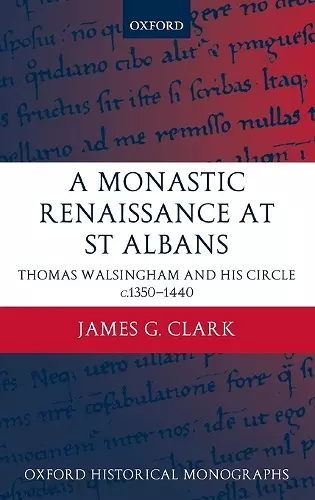A Monastic Renaissance at St Albans
Thomas Walsingham and his Circle c.1350-1440
Format:Hardback
Publisher:Oxford University Press
Published:9th Dec '04
Currently unavailable, and unfortunately no date known when it will be back

A Monastic Renaissance at St Albans is a study of intellectual life at the abbey of St Albans - one of Britain's greatest Benedictine monasteries - during the lifetime of Thomas Walsingham (c.1340-1422), one of the most prolific scholars of the later middle ages. It has always been assumed that the monasteries fell into decline long before the dissolution and that cultural and intellectual activities were largely abandoned as the monks surrendered themselves to high living and low morals. This study challenges this view. Drawing on a wide variety of manuscript sources, it shows that education, independent study, and even the co-ordinated copying of books continued to flourish at St Albans (and its affiliate houses) for much of the fourteenth and fifteenth centuries. In fact the abbey emerged as one of the country's most influential centres of learning, a clearing-house for books and ideas in Ricardian and Lancastrian England. Thomas Walsingham himself played a key part in this renaissance in monastic studies; his works were copied and circulated throughout the St Albans network and his influence acted upon the next generation of monastic readers and writers. Walsingham was not only a compiler of contemporary chronicles but also a Classical scholar of extraordinary originality. His commentary on Ovid's Metamorphoses, his re-working of the histories of Alexander of Macedon and the Trojan War, and his Genealogia deorum gentilium, are discussed in detail here for the first time. Walsingham's interest in the Classics was shared by many of his St Albans colleagues, and they in turn were members of a wider circle of literary scholars, which included the London schoolmaster, John Seward. The work of these scholars, monastic and secular, points towards a revival of Classical and literary scholarship in England long before Italian humanism and other traces of the continental Renaissance first found their way into the country.
Especially valuable is the new light he throws on classical studies by monks in the abbey and at Oxford... this is a very interesting book which should stimulate research on monastic culture in the late Middle Ages and especially in the revival of classical studies. * Antonia Gransden, Journal of Ecclesiastical History *
...[a] thoughtful and well-presented study * G.H. Martin, The Library *
This is likely to prove an important book. Intellectual and institutional history are both greatly advanced in Clark's analysis by being married to one another, and late medieval monastic history is rescued from the slough where it has languished due to the abiding influence of Knowles and Coulton. * Ian Forrest, English Historical Review *
ISBN: 9780199275953
Dimensions: 242mm x 163mm x 22mm
Weight: 723g
328 pages